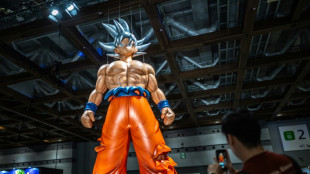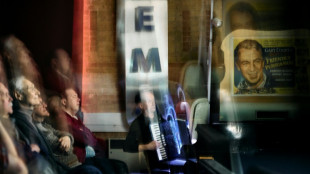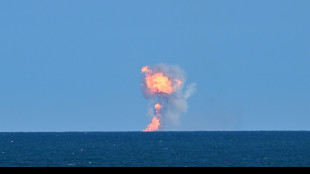
-
 Asian markets fluctuate as traders weigh geopolitical tensions
Asian markets fluctuate as traders weigh geopolitical tensions
-
'An inauspicious day': the landmines ruining Myanmar lives

-
 UN to vote again on Gaza ceasefire, US plans unclear
UN to vote again on Gaza ceasefire, US plans unclear
-
Japan's manga powerhouse 'Dragon Ball' turns 40

-
 Japanese, Koreans bottom of global love life survey
Japanese, Koreans bottom of global love life survey
-
Son blames 'mistakes' after South Korea held by Palestine in qualifier

-
 Japan ramps up tech ambitions with $65 bn for AI, chips
Japan ramps up tech ambitions with $65 bn for AI, chips
-
Lights, action, melodrama! Silent films get new reel at London haven

-
 Myanmar led world in landmine victims in 2023: monitor
Myanmar led world in landmine victims in 2023: monitor
-
ICC to sentence Timbuktu war criminal

-
 Ugandan opposition figure Besigye 'kidnapped', says wife
Ugandan opposition figure Besigye 'kidnapped', says wife
-
Australia's Jason Day eyes more major glory after resurgence

-
 Machu Picchu security boosted after visitors spread human ashes
Machu Picchu security boosted after visitors spread human ashes
-
Popovic hails Australia character in 'crazy' World Cup qualifier

-
 Taliban govt clearing 'un-Islamic' books from Afghanistan shelves
Taliban govt clearing 'un-Islamic' books from Afghanistan shelves
-
Argentina beat Peru as Uruguay hold Brazil

-
 Asian markets struggle as traders weigh geopolitical tensions
Asian markets struggle as traders weigh geopolitical tensions
-
Tatum stars as Celtics end Cavaliers unbeaten start

-
 Hurting India under pressure in blockbuster five-Test Australia series
Hurting India under pressure in blockbuster five-Test Australia series
-
'They killed her dream': Israel strike leaves woman footballer in coma

-
 Iraq holds its first census in nearly 40 years
Iraq holds its first census in nearly 40 years
-
Iraqis face tough homecoming a decade after IS rampage

-
 Russian net tightens around last civilians left in eastern Ukraine
Russian net tightens around last civilians left in eastern Ukraine
-
Olympic champion Tebogo aims to inspire next generation of African athletes

-
 Valencia on target as ten-man Ecuador upset Colombia
Valencia on target as ten-man Ecuador upset Colombia
-
'Rust' to premiere three years after on-set shooting

-
 Strike at French cognac maker Hennessy over measures in China spat
Strike at French cognac maker Hennessy over measures in China spat
-
Xi, Lula meet in Brasilia to 'enhance ties'

-
 SpaceX fails to repeat Starship booster catch, as Trump watches on
SpaceX fails to repeat Starship booster catch, as Trump watches on
-
'I have left a legacy': Nadal retires from tennis

-
 US recognizes Venezuela opposition's Gonzalez Urrutia as 'president-elect'
US recognizes Venezuela opposition's Gonzalez Urrutia as 'president-elect'
-
European powers, US seek to censure Iran at UN nuclear watchdog board

-
 UNAIDS chief says husband, Ugandan opposition figure Besigye, 'kidnapped'
UNAIDS chief says husband, Ugandan opposition figure Besigye, 'kidnapped'
-
Nadal's sensational career ends as Netherlands defeat Spain in Davis Cup

-
 US announces talks with Israel over civilian casualties in Gaza
US announces talks with Israel over civilian casualties in Gaza
-
SpaceX fails to repeat Starship booster catch, as Trump looks on

-
 G20 summit ends with Ukraine blame game
G20 summit ends with Ukraine blame game
-
Trump appoints TV celebrity 'Dr. Oz' to key US health post

-
 European stocks fall on Ukraine-Russia fears, US focused on earnings
European stocks fall on Ukraine-Russia fears, US focused on earnings
-
Last-gasp Szoboszlai penalty rescues Hungary draw with Germany

-
 Germany, Netherlands draw as Nations League group stage ends
Germany, Netherlands draw as Nations League group stage ends
-
Hong Kong tycoon Jimmy Lai takes witness stand in collusion trial

-
 Guardiola set to extend stay as Man City boss - reports
Guardiola set to extend stay as Man City boss - reports
-
Minnows Botswana hold Egypt to qualify with Mozambique, Tanzania

-
 Inter Miami coach Martino leaving club for 'personal reasons' - club source
Inter Miami coach Martino leaving club for 'personal reasons' - club source
-
Chinese man sentenced to 20 months for Falun Gong harassment in US

-
 Hong Kong court jails 45 democracy campaigners, drawing condemnation
Hong Kong court jails 45 democracy campaigners, drawing condemnation
-
'I did it for Rafa': Alcaraz after keeping Spain Davis Cup dream alive

-
 Alcaraz keeps Spain and Nadal Davis Cup dream alive
Alcaraz keeps Spain and Nadal Davis Cup dream alive
-
Trump names China hawk Howard Lutnick commerce secretary


Tent demos turn West Bank eviction into rallying cry
Flanked by smartphone-wielding peace activists, members of an evicted Palestinian family marched onto land seized by armed Israeli settlers, shouting "Out! Out!" as they livestreamed the confrontation on Instagram.
After Israeli security forces turned them away, they retreated to their makeshift base: a fast-growing tent encampment for supporters of the family -– the Kisiyas -– that has spotlighted their plight amid widening settler attacks in the Israeli-occupied West Bank.
Violence in the West Bank has surged alongside the war in Gaza, with at least 640 Palestinians killed by Israeli troops and settlers since Hamas's October 7 attack, according to an AFP tally based on Palestinian health ministry figures.
At least 19 Israelis have also died in Palestinian attacks during the same period, according to Israeli officials.
Yet weeks of demonstrations at the tent near the Kisiyas' home in Beit Jala, south of Jerusalem, have made their story stand out, attracting anti-settlement activists, lawmakers, rabbis and Palestinians from other communities facing similar incursions.
The daily gatherings feature meals, prayer, singalongs and lessons on non-violent resistance, usually followed by a caravan to the site to demand that the settlers leave.
During one such encounter on Thursday, Kisiya family members grabbed whatever they could -– mattresses, electrical cables, fruit from a pomegranate tree -– while activists tried to tear down settler-erected fences.
On Friday, 70 Israeli Jews held Shabbat services at the encampment and spent the night there.
It is the kind of show of solidarity that was once more common but has become vanishingly rare during the war, organisers said.
"We will stay here until we get back our land," 30-year-old Alice Kisiya told AFP.
The settlers "took advantage of the war. They thought it would end in silence, but it didn't."
- 'Example to show the world' -
Some details of the Kisiyas' story have helped turn it into a rallying cry.
They are one of the area's few Christian families, and the land's stepped agricultural terraces sit in one of its few accessible green spaces.
Yet Knesset member Aida Touma-Suleiman told AFP that while the mobilisation around their struggle might be unusual, the challenges the Kisiyas face are common.
"I wish we can be able to stand near each family like this, but maybe this can be an example to show the world what is happening," she said.
Earlier this month, Israel's far-right Finance Minister Bezalel Smotrich announced the approval of a new settlement in the same area of the Kisiya encampment that the United Nations says would encroach on the UNESCO World Heritage site of Battir.
The news drew international outcry, with Washington and the United Nations saying the settlement known as Nahal Heletz would jeopardise the viability of a Palestinian state.
All of Israel's settlements in the West Bank, occupied since 1967, are considered illegal under international law, regardless of whether they have Israeli planning permission.
The Kisiyas have for years been threatened by settlement activity, and in 2019 the civil administration demolished the family's home and restaurant.
The latest run-in occurred on July 31, when settlers from a nearby outpost accompanied by soldiers "raided the land, assaulting members of the Kisiya family and activists trying to force them to leave the area", according to Israeli anti-settlement group Peace Now.
- 'Is it dangerous?' -
The Kisiyas joined with activists to form the encampment just over a week later, although it got off to a slow start.
"I wish there was a camera when we first started. We were just sitting with chairs, had nothing in here. And we were discussing, like, 'What are we doing?'" said Palestinian activist Mai Shahin of Combatants for Peace.
"The first week was really hard," she said, with people, initially hesitant to join the encampment, calling to ask her: "Is it dangerous?"
As it has grown in size, Palestinians from elsewhere have come to see the encampment as a safe space.
"I have a lot of trauma from wearing my own keffiyeh (scarf) and wearing my identity for everyone to see," said Amira Mohammed, 25, of Jerusalem.
In the encampment "we were able to actually be ourselves, wear our keffiyehs, sing our songs in our language with our Israeli counterparts".
But some activists point out that despite the energy in the encampment, the current Israeli government appears set on expanding settlement activity.
"No anti-Israeli and anti-Zionist decision will stop the development of settlements," Smotrich, who himself lives in a settlement, posted on X this month.
"We will continue to fight against the dangerous project of creating a Palestinian state by creating facts on the ground."
Activist Talya Hirsch said such statements leave her with "no hope for this land" and "no vision of a better future".
"But I don't move from this place. I have no hope but I have a high sense of responsibility."
R.Lee--AT
